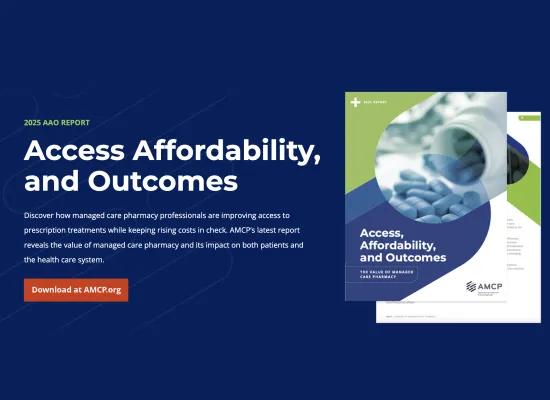
AMCP Foundation Issues Two Major Reports: Symposium Report on Balancing Access and Use of Opioid Therapies; and Assessment of Future Health Care Trends
Alexandria, Va., Nov 30, 2016 — The Academy of Managed Care Pharmacy (AMCP) Foundation has released two major reports that address some of the most perplexing challenges facing the U.S. health care system today. A Symposium Report details a broad array of strategies and best practices for managing opioid therapies while minimizing addiction risks. And a separate white paper assesses policy implications and challenges related to expected health care trends through the end of the decade.
“The AMCP Foundation is proud to present such timely research on issues of utmost importance to patients, providers and payers alike,” said Paula J. Eichenbrenner, CAE, Executive Director of the AMCP Foundation. “Research is at the heart of our mission, and we will share these findings with diverse stakeholders to help improve the delivery of care during a time of unprecedented change to U.S. health care.”
The 40-page Symposium Report summarizes the AMCP Foundation’s 6th Annual Research Symposium, “Balancing Access and Use of Opioid Therapy.” More than 125 participants representing health plans, providers, advocacy groups, payers and other stakeholders attended the full-day Oct. 3 event. The report highlights different stakeholder perspectives on how entities can work together to ensure patients have appropriate access to opioid pain therapies, while preventing their abuse.
Nearly 2 million Americans in 2014 suffered from substance use disorders related to prescription opioids, according to the Substance Abuse and Mental Health Services Administration. Annual costs to hospitalize individuals with opioid abuse and related depen¬dencies tripled over a 10-year period to nearly $15 billion in 2012.
Recommendations from the Symposium to address the problem include improving opioid prescribing, increasing the use of naloxone to reverse overdose, and expanding the use of medication-assisted treatments.
Symposium moderator Brett Norman, health policy editor at POLITICO magazine, noted that “one of the most confounding problems with the opioid epidemic from a policy perspective is that nearly every part of the health care system has aided and abetted the spread of the epidemic in some fashion.”
Topics covered in the report include:
• Keynote Address: Overview On Opioid Pain Therapy Misuse and Abuse and Federal Initiatives;
• Managed Care Pharmacy’s Leadership and Opportunities in CARA Implementation;
• Patient Perspective – Access to Appropriate Therapy;
• Prescriber Perspectives, Challenges & Responsibilities;
• Opioid Use Monitoring Measures;
• Managed Care and Health Plan Perspectives;
• Treating Chronic Pain with Opioids: Where Are We?
AMCP CEO Susan A. Cantrell, RPh, CAE, noted that managed care can play a unique role in helping to address the problem. “Because of the central role that managed care organizations play in population management — as well as appropriate medication selection, care coordination and health care provider education — these organizations are uniquely positioned to provide solutions to the complicated problems of addiction treatment,” she said.
The Symposium Report is available can be found online. It also will be delivered with the January 2017 issue of the Journal of Managed Care & Specialty Pharmacy.
Meanwhile, the new white paper analyzes findings in the Foundation’s landmark Top 10 Emerging Health Care Trends report, with an eye on policy implications and challenges related to three key areas: (1) value-oriented approaches; (2) integrated health care delivery; and (3) population health improvement. The AMCP Foundation believes these areas will most significantly impact benefit design and health care delivery at least through 2020.
Among the questions the white paper addresses is whether the $2.8 trillion spent in the U.S. health care system is an investment in the well-being of the populace and the productivity of its workforce. If so, the spotlight must be on population health improvement, which relies heavily on a better understanding of where the opportunities to improve care and change behaviors lie.
About the AMCP Foundation
Established in 1990, the 501(c)3 nonprofit AMCP Foundation exists to advance collective knowledge and insights on major issues associated with the practice of pharmacy in managed health care settings. By facilitating innovative research initiatives and providing educational opportunities to learn about managed care pharmacy, the AMCP Foundation invests in the future of managed care. The Foundation is the philanthropic arm of the Academy of Managed Care Pharmacy (AMCP). Visit www.amcpfoundation.org.
Featured News & Resources
See Full CalendarAward Applications Open
AMCP eLearning Day: Nexus Encore
AMCP 2026 Registration Opens
Upcoming Events
AMCP offers a wide variety of educational opportunities, from events and webinars to online training.







